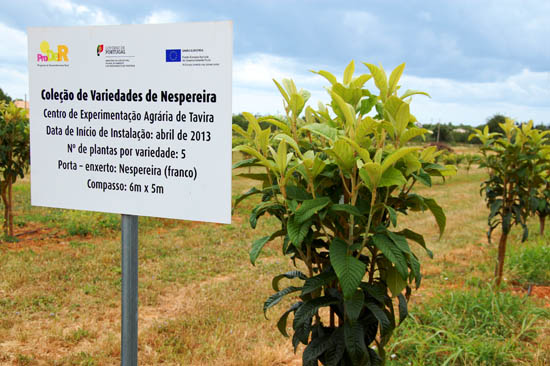 Varieties such as 'Bico de Passarinho', 'Rabo de Porco', 'Romana', 'Mulata', 'Rabo de Zorra', 'Lourecinha' will be announced next Friday, September 8th, at 10:00 am, at visit September 8, at 11:00 am, a visit to the Fruit Tree Collections, at the Tavira Agrarian Experimentation Center (CEAT), under the guidance of technicians from the Algarve Regional Directorate of Agriculture and Fisheries (DRAP Algarve).
Varieties such as 'Bico de Passarinho', 'Rabo de Porco', 'Romana', 'Mulata', 'Rabo de Zorra', 'Lourecinha' will be announced next Friday, September 8th, at 10:00 am, at visit September 8, at 11:00 am, a visit to the Fruit Tree Collections, at the Tavira Agrarian Experimentation Center (CEAT), under the guidance of technicians from the Algarve Regional Directorate of Agriculture and Fisheries (DRAP Algarve).
This activity is part of the Mediterranean Diet Fair, which takes place from the 7th to the 10th of September, in Tavira.
These collections, considered unique in the country, are the result of the work developed by DRAP Algarve, between 2011 and 2015, within the scope of projects supported by the Rural Development Program (Proder): Frutalg – “Prospection, Collection, Conservation and Characterization of Traditional Varieties of Algarve Fruit Trees with Interest for Agriculture” and SulVeries – “Prospection and Characterization of the Genetic Variability of Varieties of Indigenous Vines in the Alentejo and Algarve Regions”.
In the case of the Frutalg project, work began with the prospecting and collection of plant material from citrus, carob, almond, fig, loquat, pomegranate and apple trees (Pero de Monchique) and subsequent installation of these traditional varieties in the collections.
The objective is to assess their potential, select and provide vegetative material to authorized nurseries for future multiplication and use by the productive sector.
As revealed in 2014, to the report of Sul Informação, engineer António Marreiros, responsible for the project, in the fields of the former Posto Agrário de Tavira, next to the station, there are 122 varieties of almond, 19 of loquat, 26 of Monchique pear, 56 of pomegranate, 44 of carob and 97 varieties of fig trees.
The SulCastas project, in its first phase, aimed to discover and preserve various varieties of grapes in danger of extinction and plant them in regional and national collections.
In a second moment, the characterization of the planted material, its evaluation and the carrying out of microvinification studies are foreseen, which could lead to its production.
If you want to know more about this collection of fruit trees, click here.
To consult the complete program of the Mediterranean Diet Fair click here


















Comments